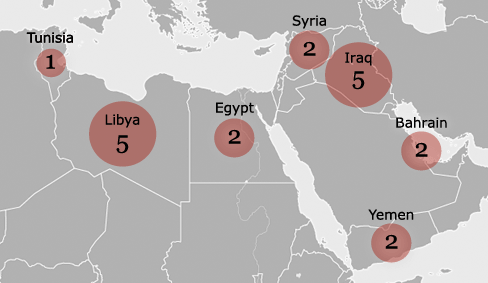Journalists worked in extraordinarily dangerous conditions during the eight-month uprising that ended 42 years of rule by Muammar Qaddafi and led to his death. Five journalists were killed amid fierce fighting between rebels and loyalists. Qaddafi’s regime unleashed a widespread campaign to silence foreign and local journalists, detaining dozens in abusive conditions. In February, Qaddafi invited reporters to the capital, Tripoli, only to restrict them to the Rixos Hotel, monitor their every move, and prevent them from reporting on anything other than the government line. In their efforts to block news coverage, authorities also jammed satellite signals, severed Internet service, cut off mobile phone networks and landlines, and attacked news facilities. While the crumbling regime was able to orchestrate coverage for a time in Tripoli, it failed to prevent the press from disseminating information about rebel advances in the rest of the country. Press freedom violations persisted after the Libyan rebel government, known as the National Transitional Council, or NTC, took power in August. One journalist was brutally assaulted in Benghazi that month, and the NTC placed one pro-Qaddafi journalist under house arrest.
Libya
» More than 100 anti-press attacks reported during the revolution.
» Qaddafi forces use mass detentions, obstruction in failed effort to silence coverage.
Journalists worked in extraordinarily dangerous conditions during the eight-month uprising that ended 42 years of rule by Muammar Qaddafi and led to his death. Five journalists were killed amid fierce fighting between rebels and loyalists. Qaddafi’s regime unleashed a widespread campaign to silence foreign and local journalists, detaining dozens in abusive conditions. In February, Qaddafi invited reporters to the capital, Tripoli, only to restrict them to the Rixos Hotel, monitor their every move, and prevent them from reporting on anything other than the government line. In their efforts to block news coverage, authorities also jammed satellite signals, severed Internet service, cut off mobile phone networks and landlines, and attacked news facilities. While the crumbling regime was able to orchestrate coverage for a time in Tripoli, it failed to prevent the press from disseminating information about rebel advances in the rest of the country. Press freedom violations persisted after the Libyan rebel government, known as the National Transitional Council, or NTC, took power in August. One journalist was brutally assaulted in Benghazi that month, and the NTC placed one pro-Qaddafi journalist under house arrest.
-
5
Journalists killed -
101
Attacks on journalists, facilities -
6
Months Internet disrupted -
50
Detentions -
11
Missing for a time
Libya was among the deadliest places for journalists in 2011. Five journalists were killed covering the conflict, CPJ research shows. The victims included Al-Jazeera cameraman Ali Hassan al-Jaber and Mohammed al-Nabbous of the online opposition broadcaster Libya Al-Hurra TV, both shot while covering unrest; acclaimed photojournalists Tim Hetherington and Chris Hondros, who were killed by a mortar round; and South African photographer Anton Hammerl, who was killed by government forces.

CPJ documented 101 attacks on journalists and news facilities during the eight-month revolution. Journalists were consistently targeted by government forces and subject to mass detentions, equipment confiscations, expulsions, and assaults, CPJ research shows.
50: Detentions
22: Expulsions
11: Assaults
8: Abuses in custody
5: Instances of equipment seizures or destruction
3: Other injuries
2: Attacks on news facilities
Initially shut down by authorities on February 19, Libya's Internet sustained disruptions until August 22. Other regional governments facing civil unrest tried this tactic as well, with limited success. Historically, some Asian governments have also used Internet shutdowns to quell dissent.
Other government disruptions of Internet service:
Nepal, 2005: After a declaration of martial law by the king, the Internet and telephone networks were shut down.
Burma, 2007: Recurrent Internet blackouts during the pro-democracy Saffron Revolution.
Iran, 2009-11: Targeted slowdowns of the Internet, blocking of anti-censorship tools such as Tor and virtual private networks, and pervasive monitoring of Internet traffic.
China, 2009: Internet connections cut in parts of Urumqi in northwestern Xinjiang in response to outbreaks of violence involving the predominantly Muslim Uighur minority.
Tunisia, 2010-11: Escalating censorship during the popular uprising, culminating in attempts by the authorities to obtain passwords of users of Gmail, Facebook, and Yahoo Mail.
Egypt, 2011: At the height of public demonstrations, Egypt shut down Internet access for six days.
Syria, 2011: Sporadic slowdowns on certain websites, services such as Skype, and encrypted communication tools.
Dozens of foreign and local journalists were detained during the eight-month conflict, several for extended periods. As the political unrest intensified between rebel forces and pro-Qaddafi militants, authorities stepped up intimidation of journalists, detaining them in abusive conditions, CPJ research shows.
Detainees represented a variety of outlets. Among them:
Corriere della Sera: 13
Al-Jazeera: 4
The New York Times: 4
MBC: 4
BBC: 3
Reuters: 1
Global Post: 1
The Guardian: 1
Al-Shams: 1
O Estado de S.Paolo: 1
Al-Jamahiriya: 1
During the height of the conflict, at least 11 local and international journalists were reported missing for varying periods, CPJ research shows. All were accounted for by late year.
Those who went missing during the year:
7 Libyan journalists
--Atef al-Atrash, freelance
--Mohamed al-Sahim, freelance
--Mohamed al-Amin, freelance
--Idris al-Mismar, Arajin
--Salma al-Shaab, Libyan Journalists Syndicate
--Suad al-Turabouls, Al-Jamahiriya
--Jalal al-Kawafi, freelance
4 International journalists
--Ghaith Abdul-Ahad, The Guardian
--Dave Clark, Agence France-Presse
--Roberto Schmidy, Agence France-Presse
--Joe Raedle, Getty Images
